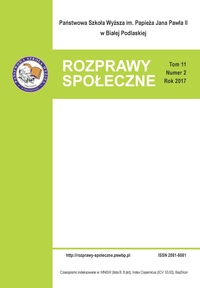Optymizm a efektywność zawodowa pracowników. Część II. Interpretacja zdarzeń negatywnych
Optimism versus work effectiveness. Part II. Interpretation of negative events
Author(s): Ewelina DreslerSubject(s): Economic development, Socio-Economic Research
Published by: Państwowa Szkoła Wyższa im. Papieża Jana Pawła II w Białej Podlaskiej
Keywords: optimism; efficiency; the style of explaining; range, stability and personalization; interpretation of negative events
Summary/Abstract: Introduction. The following article is the second part of considerations on optimism and its connection with efficiency in the workplace. It has been described in regard to how negative events are interpreted by workers. The aim of the article is to check whether there is a relationship between workers’ efficiency and different dimensions of optimism, its range, stability and personalization resulting from negative events. Material and methods. The article was prepared on the basis of the research findings obtained in the project conducted under the Fund Grants for Research at Pope John Paul II State School of Higher Education in Biała Podlaska. The study was based on the concept of optimism by Martin Seligman. Results. The result of the research confirm the connection between the level of efficiency and optimism and the way negative events are interpreted. In turn, there was no connection found between the way such events were personalised and the level of employees’ efficiency. Conclusions. The study results allow to draw some general conclusions about the existing connection between the level of optimism in regard to interpretation of negative events and efficiency at work. However, it requires further research, which may have practical application in improving workers’ performance at work through teaching them optimism.
Journal: Rozprawy Społeczne
- Issue Year: 11/2017
- Issue No: 2
- Page Range: 50-56
- Page Count: 7
- Language: Polish

